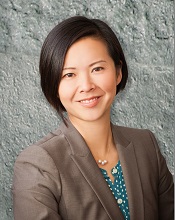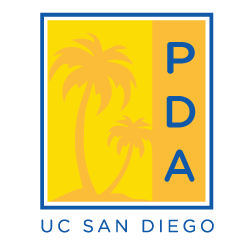
Janine Low-Marchelli, Ph.D.
Technical Support Scientist | The Jackson Laboratory

- Interview Overview
Interview Overview
Interviews and Editing by: Alexandra Bortnick
Interview: September 2015
Transition: August 2014
1. Please list your previous department at UC San Diego and provide a brief description of the research you conducted?
I was a postdoc in Catriona Jamieson’s laboratory in the Department of Medicine. My research focused on the influence of the extracellular matrix in leukemic stem cell (LSC) maintenance in hematopoietic diseases. Since LSCs have different properties than bulk tumor cells, a lot of the standard of care drugs do not eliminate them, allowing the disease to relapse. Our lab focused on developing new therapies to target LSC.
2. Please describe your current job profile?
I am a customer-facing technical support scientist at a non-profit organization called The Jackson Laboratory (JAX). Our organization is the largest mouse repository in the world with over 8000 unique mouse strains that are used for biomedical research. I spend most of my day problem-solving and educating researchers needing help selecting mouse models or troubleshooting their experiments. I direct them to relevant publications, tools/services, and databases to get them the answers they need to complete their research. Additionally, I present webinars or on-site seminars on mouse research-related topics, contribute articles to our newsletter, and serve as an education and information resource within the JAX community.
3. What made you decide to transition into your current position?
As a bench scientist, I enjoyed being the go-to person when someone in the lab needed help, be it training on a piece of equipment or a new technique that I knew how to do, helping to interpret other people’s results, or troubleshooting or consulting on experiments. Outside of the lab, I was always involved in some kind of outreach activity, many involving some form of teaching science to students or the general public. I knew that I wanted to feel that same sense of purpose in my career, and at the end of each day, to feel that I contributed something meaningful to someone else’s life. Though my lab was very translational in nature, having beautiful QPCR replicates and perfectly exposed Western blots wasn’t really cutting it for me!
4. Apart from the research you conducted, do you feel like anything in particular has helped you acquire your current position?
Not being afraid to take a different path than what was expected of me. I found the AAAS MyIDP career assessment tool to be really telling (http://myidp.sciencecareers.org). It's a self-assessment where you rate what you are good at and what you enjoy doing. Then, there is some magical algorithm that matches your abilities and your desires with science careers. It was pretty spot on for me: the best match was a career working in science museums, which has been my dream career path for ages. Second in line was what I do now. Way on the bottom of the list was PI at a university. I guess I didn’t need the assessment to tell me that, but it did give me more confidence to listen to that part of my brain.
Note from Editor: As Janine indicates, the Individual Development Plan (IDP) can be an extremely useful self-assessment tool. The Office of Postdoctoral and Visiting Scholars Affairs (OPVSA) offers interactive workshops (http://postdoc.ucsd.edu/idp/index.html) to help postdocs create an IDP, assess their skills, work with mentors, and set realistic and achievable goals. Postdocs will have the opportunity to develop and present their IDP to faculty participants for feedback, and by the end of the session, have a completed IDP to guide their career objectives.
5. Please list some of the most striking similarities and differences between your postdoc and current position?
The biggest difference, aside from not being on the bench, is time. The workday isn’t nearly as flexible as being a postdoc. The benefit of that is that my work has very defined goals and I can do most of it from a computer, as opposed to running to the lab on weekends to take care of cells or mice. I probably work a lot more now than I did as a postdoc, but it may be because this position suits me better.
Most similar to being a postdoc, I still have complex scientific discussions with researchers, read and analyze papers, sometimes interpret internal data, travel to conferences, and I still wait until the night before a presentation to really work on it.
6. Is there any specific challenge (during the entire process of transitioning) that you would like to highlight and, if so, how did you overcome it?
I needed to be in the same geographical location as my spouse, who was returning to graduate school in Northern California. There weren’t as many positions for me in this area, so that was causing me a lot of stress. I was incredibly lucky to find the exact right position in the exact right location. Twice.
I didn’t get a call-back the first time the position was available. (Submitting applications online felt like throwing my information into the Internet Garbage Can - it is hard to tell if your CV is reaching actual human beings).
So the next time the position was available, I made sure that the right people would get my CV and application. I reached out to several contacts in my LinkedIn circle as well as grad school and postdoc mentors for advice and informational interviews. Eventually that led to 1 person at JAX passing my CV on to the hiring manager and 2 different people who used to work at JAX putting in good words for me.
7. Please describe your goals and ambitions for the next 5 years?
I’d like to continue to explore the business side of our organization. I would like to be in a position where I could build stronger relationships with our customers and help them on a more strategic level.
8. What do you feel you could have done more, as a postdoc, to help prepare you for or acquire your current position?
Not much. I got the job, right?
9. What do you feel is the most important advice you can give to a current UCSD postdoc in order for them to obtain a position such as yours?
Put yourself out there and don’t be afraid to ask people (even those you don’t know very well) for help.
